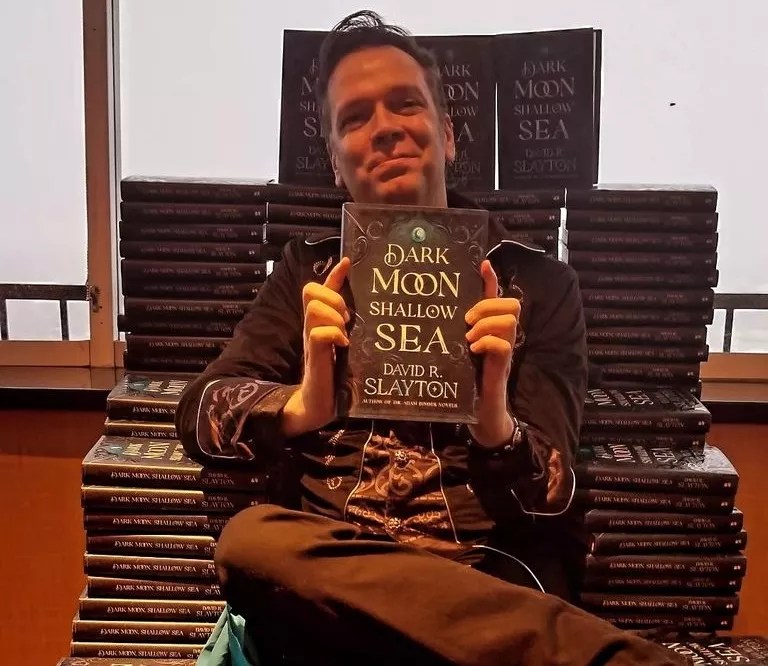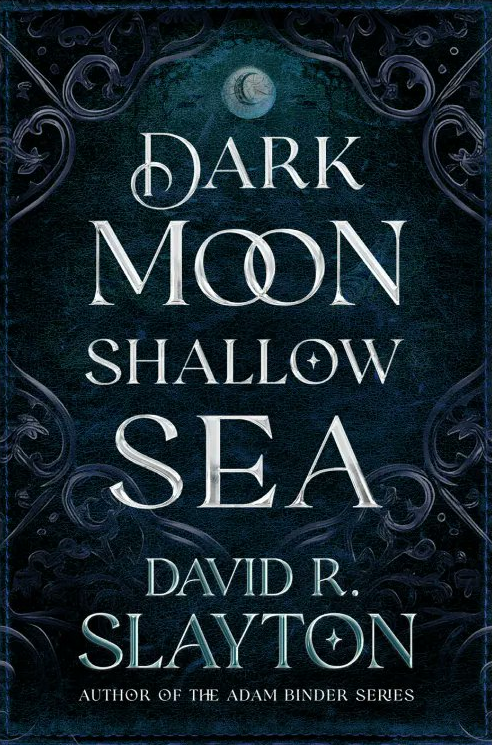
Brian McNees

Audio By Carbonatix
“I love fantasy,” says Denver novelist David Slayton, who started his own trilogy, White Trash Warlock, back in 2020. “I have always loved fantasy – but I am never in it. And if there is a gay character, they’re the villain. If we happen to be a good guy, we die tragically. And we’re never written by us, either. I love the fantasy genre, but I’ve never felt at home in it.”
Slayton admits that there are notable exceptions to this – he ticks off a few examples, which include Lynn Flewelling‘s Nightrunner saga. “That included a gay main character,” he offers, “and that was back in 1996. So there were some out there trying, but they were few and far between.”
So comes his newest novel, Dark Moon Shallow Sea, which is getting strong advance notice from critics, including Shaun David Hutchison, author of Before We Disappear, who says, “I’ve been waiting my whole life for an epic fantasy like this.” Slayton’s dark-fantasy novel hit shelves on Halloween, just in time for a launch reading event at the flagship Tattered Cover on Wednesday, November 1.

David Slayton
Slayton credits his love for the role-playing game Dungeons & Dragons as the initial inspiration for the novel and its characters. “I actually came up with these characters playing the original Baldur’s Gate,” he says, referring to the 1998 BioWare classic game that’s currently enjoying massive success in its third full iteration. “Two of the main characters, Raef and Kinos, both started in that game, because I figured out that if you played multiplayer by yourself [Baldur’s Gate was intended as a single-player game populated by non-player characters], you could play more than one character.”
It’s one of the dreams of many role-players – to turn a game they’ve grown to love into a book, even a series of books, to share with the rest of gamer culture. But Dark Moon Shallow Sea is more than just a fantasy lover’s fantasy gig come true: Slayton says that it’s a way that he himself can feel like a part of the genre.
After he sold his first series, Slayton was working with his editor to discuss what came next for him in terms of future plans. It’s the traditional question every career writer is asked: What are you working on now? That editor challenged Slayton to describe what, at his core, he wanted to create. “I said, ‘I write stories about gay characters that are not about being gay,'” says Slayton. “I don’t want to write about coming out. I don’t want to write about family acceptance and all that stuff. I have other stories I want to tell.”
It’s good advice for any writer: Write what you want to read. And it’s Slayton’s primary goal with Dark Moon Shallow Sea. “What do I want to see in the marketplace that I can’t find?” he asks. “That’s the missing piece I want to provide.”
And Slayton loves to read dark fantasy: “I love all the stuff about dead gods and these epic stories set in a dying world. There’s a D&D influence there, for sure, but there’s a lot of video games mixed in there, too. Baldur’s Gate, obviously, but also Dark Souls, or Thief. A dark world where the hero is forced to navigate the shadows and bear up in a somewhat gloomy existence.”
But Dark Moon Shallow Sea was also born from his love for Raef as a character. “The more I wrote about him, the more I wanted to know about him. To see the world through his eyes and, in doing so, see him from many angles. He has a lot of my anger,” admits Slayton. “He’s been branded a heretic; he’s suffered religious persecution. He’s had to hide who he is. Raef is very much like me when I was 23, when I was angrier. And he thinks about himself as such a badass, right? He thinks he’s so tough, but he has this secret soft side. He might talk about killing you, but in the end, he can’t.”
Slayton also speaks with fondness about the book’s primary antagonist, Seth, a knight in service to Hyperion, and part of the forces that killed the moon goddess Phoebe and unleashed undeath on an unwitting world. “Seth was conceived very much as a total villain,” smiles Slayton. “A mustache-twirling cliché. But the more I spent time with him, the deeper he became, and the more I fell in love with him.”
Fantasy hasn’t dealt directly with LGBTQ+ issues very recently, very extensively, or very well, Slayton avers. “Traditional fantasy is based heavily on Western European models,” he says. “Historically, the history of homosexuality has been erased from that time. We pretend that gay people didn’t exist. And there’s this weird standard that we hear from some corners, that fantasy has to be historically accurate. There has to be this much rape and this much misogyny. Well, no. We didn’t have dragons and magic, either, y’all. Unless you’re writing historical fiction, we can do anything we want with gender roles, homophobia, racism and so forth. We don’t have to include those things. It’s fantasy. And we all want to see ourselves in the stories we read.”
Slayton will read and sign books at Tattered Cover, 2526 East Colfax Avenue, 6 p.m. Wednesday, November 1. The event is free, but registration is requested on Eventbrite. For more information on the book and the reading, visit the Tattered Cover website.